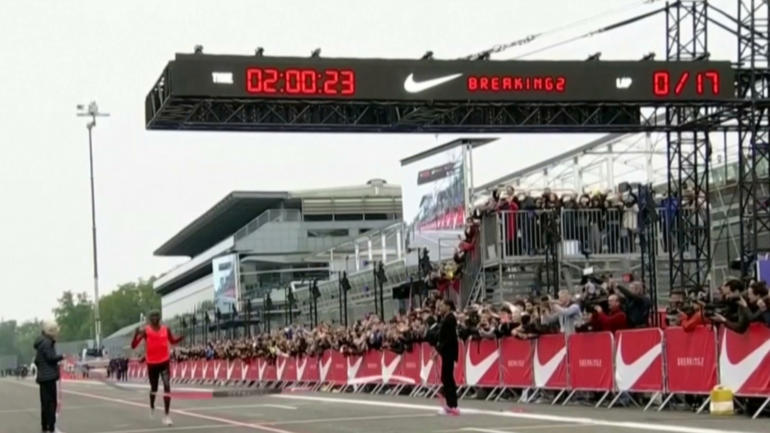It’s a goal long-distance runners have always dreamed of achieving: running a marathon in less than two hours. CGTN’s Hendrik Sybrandy reports.
“It’s just as huge as running a sub-four minute mile,” said Mark Plaatjes, a former world-class marathoner. “Until Eliud Kipchoge came along, nobody thought we would see it maybe in our lifetime.”
Plaatjes came somewhat close at 2:08:50, his personal best. Eliud Kipchoge of Kenya, who’s won 11 of the 12 marathons he’s entered, has taken the sport to a different level.
“He hasn’t had a bad race yet,” Plaatjes said.
“I am excited to be here,” said Kipchoge several days ago as he arrived in Vienna, Austria. “I am really looking forward to making history.”
He was there to do the once unthinkable: run 26.2 miles, or 42 kilometers, in 1:59:59 or less, competing against the clock as opposed to other athletes as part of the INEOS 159 Challenge.
“It’s a big deal,” said Rodger Kram of the University of Colorado Boulder. “It’s a nice round number.”
The amateur runner and physiology professor runs the school’s Locomotion Lab where the biomechanics of sports like running are studied. Kram and others came up with a way to measure how the layout of a race course affects a marathoner’s performance. In an ideal world, he said, the course is a straight shot that’s pancake flat.
In reality, elevation gains and turns, can add precious seconds to a runner’s time.
“There’s no free lunch in running,” Kram said. “You might think that if it’s half up and half down that’s a wash but that’s not the case. Going up costs you more than going down saves you.”
Using Google Earth to measure curves along the route in Vienna and an on-the-ground volunteer with an altimeter, Kram determined the course would cost Kipchoge just five seconds, information race organizers wanted to know.
“It’s very close to a perfect course,” he said. “This is what happens when you get six running nerds who have something that really captivates our interest. We want to try to analyze it.”
Much as Kram once calculated that Nike’s “Vaporfly” shoe made running four percent more economical. Kipchoge holds the current world record, 2:01:39, set at the Berlin Marathon last year. His use of pace runners in Vienna made him ineligible to set a world record this time. Plaatjes said lack of official recognition shouldn’t detract from Kipchoge’s accomplishment.
“Our sport needs something positive and I think it comes at the right time,” he said. Kram believes his work is proof that math has a place in sports.
“It’s an opportunity to promote that science is fun, it’s not just boring equations,” he said. In fact, numbers, the “nice round number two” to be more exact, is what Eliud Kipchoge’s quest has been all about.
 CGTN America
CGTN America

